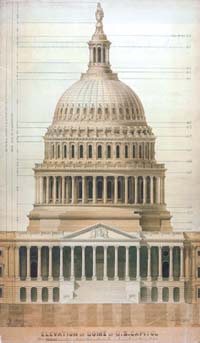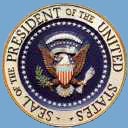Lesson 1
Nation and State
|
Governments make and carry out rules.
They also settle arguments about rules. The rules that governments
make are called laws. Towns and counties have governments. States,
tribes, and nations do too.
|
|
In the United States, it is the
citizens
who give authority to governments. Authority is the power to make
people do things. This power is given through laws. The men who set
up our country made the first and most important law. It is the
Constitution of the United States (you read about this in Unit 1).
The Constitution is the highest law in our country. All other laws
are built from it. It says that our government will stand up
for people’s rights. Our government will also work for the good of
all the people.
The leaders who wrote the
Constitution wanted people to have the right to change the law.
Changes to the Constitution are called amendments. The first ten
amendments are called the Bill of Rights. The Bill of Rights
is about personal rights. It gives us freedom of speech. It says
that all people can practice whatever religion they choose. It says
that each citizen has a right to a fair trial. Later, the Nineteenth
Amendment gave women the same rights as men.
The Constitution sets up the national
government in Washington, D. C. It sets up state governments. It
makes the states share power with the national government. Only the
national government can do some things. Only the states can do other
things. Some things both can do. The sharing of power in this way is
called federalism.
|

United States Constitution

Photo from U.S. Capitol Historical
Society brochure
|
|
|
|
Only the national government can declare
war or make treaties with other nations. The national government can
issue money. It can oversee trade among the states. The states
cannot do these things. States can ratify amendments to the
Constitution. States must look after the health and safety of their
people. Both
nation and state can collect
taxes. They can both set up courts and
protect people’s rights.
|
|
Citizens choose government leaders by voting
in elections. A citizen must be eighteen years old to vote. The
states hold the elections. A person who is elected will serve one
term. A term is a set number of years. To serve more than one term,
a person must be elected again. Elections and terms make sure that
leaders do not get too strong. They must not forget to do what the
people want them to do.
|

Photo courtesy of South Dakota State
Historical Society
|
 The Constitution also keeps governments
from getting too much power. It works like this. The governments are
set up in three branches. They are the legislative, executive, and
judicial branches. Each branch has different powers. The
legislative branch makes laws. Congress is the legislative
branch of national government. The executive branch makes sure that
laws are followed. The president is the leader of the executive
branch. The judicial branch decides what the laws mean when people
cannot agree about them. The Supreme Court and lower courts make up
the judicial branch. The Constitution also keeps governments
from getting too much power. It works like this. The governments are
set up in three branches. They are the legislative, executive, and
judicial branches. Each branch has different powers. The
legislative branch makes laws. Congress is the legislative
branch of national government. The executive branch makes sure that
laws are followed. The president is the leader of the executive
branch. The judicial branch decides what the laws mean when people
cannot agree about them. The Supreme Court and lower courts make up
the judicial branch.
|
The branches have separate powers, but
they are not
independent of each other. The Constitution sets
up checks and balances. These allow each branch to make sure that
the others are doing a good job. For example, Congress can make a
law, but the president can
veto it if he does not think it is
right. If enough members of Congress still want the law, they can
vote to ignore the veto. Congress can also
impeach a
president. The judicial branch can say that the laws that Congress
made are
unconstitutional. The courts can also say that the
president is doing things that are wrong. The president picks out
the Supreme Court
justices. Congress
votes on whether or not
it agrees with the choices. These rules check the powers of each
branch. They make sure that no branch of
government gets too strong.
The president picks out
the Supreme Court
justices. Congress
votes on whether or not
it agrees with the choices. These rules check the powers of each
branch. They make sure that no branch of
government gets too strong.
|
| Vocabulary |
|
| citizens (n.), members of a state or nation
impeach (v.), to accuse or bring charges against
independent (adj.), free; not under the power of others
justices (n.), judges who settle arguments about laws
and crimes
|
taxes (n.), money collected by a government to pay
for services
unconstitutional (adj.), against the Constitution
veto (v.), to reject
|
|
|